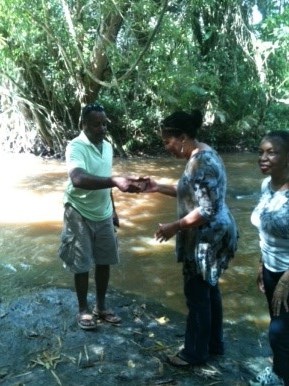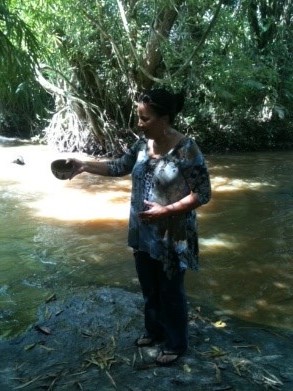An Evensong meditation by the Rev. Dr. Thee Smith
The Seventh Sunday after the Epiphany – Year C
Tonight's meditation is about giving up anger for forgiveness, and particularly giving up self-anger and self-frustration in order to achieve forgiveness.
There’s an old joke about not giving up that kind of remorse. It’s about the man who goes to his friend’s apartment to borrow a really good golf club for the afternoon. On his way there, however, he remembers the time when his friend asked to borrow his brand-new tennis racket. Now on that occasion he had hesitated just long enough to come up with the lame excuse that the racket was defective and needed a string tightened—hesitated just long enough, that is, for his friend to catch on and give him that kind of look that says, ‘We both know you’re lying. You just want to keep it for yourself.’
So, as he’s approaching his friend’s door, he’s also reproaching himself for his own past behavior.
‘Why did I say that?’ he thinks to himself. ‘So stupid of me! Now he’ll probably say the same kind of thing to me, just to get even.’
‘Yeah, he’s that’s kind of a guy; always holding a grudge. And he knows how to make people grovel at his feet to get a favor.’
Finally, he decides, ‘Well, I won’t give him the pleasure. I’ll show him!’
So, after working himself up into such a mood he reaches the apartment, knocks on the door, and as friend opens it, he turns around, walks away, and leaves him with the parting remark, ‘Keep your darn golf club, I don’t need it anyway!’
By contrast, a few minutes ago we heard the story of Joseph urging his brothers to give up their remorse and self-reproach. Despite the fact that they sold him into slavery, and now he holds the power of life and death over them, he appeals to them to trust him to be merciful and benevolent. “Now do not be distressed,” he pleads with them:
“Now do not be distressed, or angry with yourselves, because you sold me here; for God sent me before you to preserve life . . .God sent me before you to preserve for you a remnant on earth, and to keep alive for you many survivors. So it was not you who sent me here, but God . . . And he kissed all his brothers and wept upon them; and after that his brothers talked with him.” (Genesis 45:5,7-8,15)
Now this story of forgiveness and letting go of anger and self-anger has a particular spin for me during Black History Month here in the U.S. In the year 1700 one of the first antislavery documents was published in the Massachusetts colony called, The Selling of Joseph. That document connected today’s Genesis story with the Atlantic slave trade in the American colonies and argued against selling other human beings as our African brothers and sisters. In addition the book was written by Samuel Sewall, who was the judge who presided over the notorious Salem witchcraft trials, and who later publicly repented of condemning innocent persons to death.
Other interpreters have also connected the Joseph story to Jesus himself: Jesus who was sold by Judas who betrayed him for the price of a slave—Judas who was also one of his own brethren among his closest disciples. This Jesus is the one who exhorts us in today’s gospel as our Elder Brother:
“Bless those who curse you, pray for those who abuse you . . .
Love your enemies, do good to those who hate you,
and you will be children of the Most High;
for he is kind to the ungrateful and the wicked.” (Luke 6:28,35).
Becoming ‘children of the Most High’ is Jesus’ equivalent phrase for our being ‘brothers and sisters’ to one another.
Perhaps we can also hear the voice of God urging us through our Psalm appointed for today; urging us, as the Psalm says:
‘Do not fret because of wrongdoers, because of those who carry out evil devices,’ and ‘leave anger alone, it leads only to evil.’ Rather:
“Trust in the LORD, and do good; so you will live in the land, and enjoy security.
Take delight in the LORD, and [God] will give you the desires of your heart.” (Psalm 37:1,3-4, 7b-8)
That reliance on God, in place of fret and anger, is the virtue that connects our two Lessons from Genesis to our Psalm, and from Psalms to Luke: in Genesis, with Joseph urging his brothers not to be angry with themselves; in the Psalm, urging us ‘not to fret’ but to ‘leave anger alone;’ and in Luke’s gospel, with Jesus urging us to rely on God as “children of the Most High”—as sisters and brothers of one another.
For this year’s Black History Month I received another reminder of this call to sisterly and brotherly solidarity. It was sent to me from my former colleague and friend, Estella Alexander. Back in 2020 she posted in Facebook a picture of herself performing a libation ritual at the Slave River near Elmina Castle in Ghana, West Africa. That’s where enslaved Africans were given a final bath before being herded to the dungeons of the castle. There they would be imprisoned before passing through the ‘door of no return’ to board ships for the Middle Passage across the Atlantic Ocean to work plantations in the Americas.
But this year Estella told me the rest of the story of her pilgrimage to Ghana that year. After pouring libation at Slave River she had also participated in a re-naming ceremony where she was given the African (Ewe) name Tsoeke, which means ‘forgive.’ So unwelcome was this name that she found herself meditating and agitating about it until she found final acceptance when she wrote the following poem. It’s called “Proclamation of Forgiveness.”



Elmina Slave Castle and Last Bath Slave River, Ghana, West Africa
Photos courtesy of Estella Majozo Alexander, to accompany her poem: “Proclamation of Forgiveness”
Proclamation of Forgiveness
(Read at Elmina Castle, in Ghana, West Africa upon receiving the name
Afi Tsokei meaning Forgive at a traditional naming ceremony)
By Estella Conwill Majozo, Ph.D.
I must learn the dance of forgiveness
where I lay it all down, strip myself completely
to honor His sacred crown.
I must let go of this bundle hoisted high upon my head— all the heavy, weary years, our unrequited dead.
. . . . . . . . . . . . . . . . . . . . . . . . . . . . . . . . .
And all our European brothers and sisters who enslaved us, I forgive,
and our African kin who helped enslave, I surrender that we all may live.
I forgive the march to the dungeons and the ocean floor that’s paved with bones of the ancestors—
I forgive the Middle Passage grave.
I forgive myself for all the times I’ve been way too still
when forgiveness truly is the only dance that heals. I forgive because my God worked it all for my good
and because He forgave on Calvary, I know that I should.
Because Love is who He is and mercy is His crown,
I forgive, Lord God, I choose to love.
I lay it all down.
Edited for FaithAliveAHC.org by Theophus ‘Thee’ Smith 2/19/2022
‘Laying it all down’ in that poem offers us a remarkable expression for forgiveness as a kind of libation. Libations symbolize the pouring-out of something precious or life-giving, like wine or blood. In African Christian tradition it can express the life and mission of Jesus himself: his life poured out for the world in ministry and in crucifixion, and then reconstituted as holy bread and wine in the sacrament of holy communion.
So in today’s Meditation we spanned the Joseph story in Genesis and a Black History Month pilgrimage to forgiveness. And between those two stories we invoked our Psalm on giving up fret and anger, and Jesus’ teaching on forgiveness in Luke. Perhaps we can best summarize these connections in the words of our Collect appointed for this Seventh Sunday after the Epiphany.
The Collect of the Day
O Lord, you have taught us that without love whatever we do is worth nothing: Send your Holy Spirit and pour into our hearts your greatest gift, which is love, the true bond of peace and of all virtue . . .
Amen.
